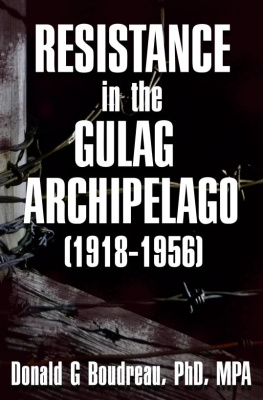RESISTANCE IN THE GULAG ARCHIPELAGO (1918-1956)
By Donald G. Boudreau, PhD, MPA
First Smashwords Edition, 2012
Copyright 2012 by Donald G. Boudreau
Published by Smashwords
Smashwords Edition, License Notes
This ebook is licensed for your personal enjoymentonly. This ebook may not be re-sold or given away to other people.If you would like to share this book with another person, pleasepurchase an additional copy for each person you share it with. Ifyoure reading this book and did not purchase it, or it was notpurchased for your use only, then you should return toSmashwords.com and purchase your own copy. Thank you for respectingthe hard work of this author.
Cover by Joleene Naylor
* * * * * * * * * *
CONTENTS:
* * * * * * * * * *
INTRODUCTION
Back in the balmy summer of 1974, I spent many hotand humid nights working as a waiter in a steakhouse restaurant,out on the highway known as US Rt. 22, in northern New Jersey. Inarriving home thereafter, late in the evening to a nearby suburb,feeling wired and needing to unwind before sleeping, I beganbedtime reading a significant number of works authored by AlexanderSolzhenitsyn. Solzhenitsyn had been receiving substantial mediaattention then, regarding his published release a year earlier in1973 of the first volume of his highly acclaimed The Gulag Archipelago , depicting life and death in theSoviet prison labor camp system during the years 1918-1956.
Given his, Solzhenitsyns firsthand perspective ofthe harsh life therein the Gulag camps, and reading his lightlyfictionalized accounts contained in his many novels and stories andpoems authored, I thought it would be useful in exploring thequestion as to how resistance manifested itself in its many waysamong the inmates in the Gulag camps. I set about to doing sothrough reading the works of Solzhenitsyn and some other observersincluding noted historians of that particular era, whose writingsdepicted or otherwise memorialized authoritative experiences, actsof dissenting, protesting, and resisting that had occurred in theGulag during those years.
In the fall of 1974, while preparing my seniorcollege thesis for the advanced Scope and Methods in PoliticalScience course at Montclair State College (now University) in UpperMontclair, New Jersey, on this very same subject, the seniorrequirement for a Political Science Major culminated in the studentpresenting an hour long oral presentation of the same writtenthesis of some serious length manuscript, before and in front ofthe entire classroom audience, comprised of the courses professorand ones fellow students.
My dear friend and fellow classmate, Janet Serra,just days before my scheduled senior presentation before the class,kindly presented me with an early surprise birthday present. It wasa first edition, hardcover of the just released volume one ofSolzhenitsyns The Gulag Archipelago . Shewas also, admittedly, sparing me in the process she had rightlysaid, the shamelessly classless embarrassment of having to readexcerpts of the same, from my much worn and rabbit eared, paperbackedition, during my hour long class presentation that she knew I wasto be delivering soon before the entire class.
Thereafter, my professor, the now since retired Dr.George T. Menake, Emeritus Professor of Political Science atMontclair State University, kindly recommended to me in the monthsthereafter upon returning the graded paper with comments, that hethought I might seriously wish to consider publishing the papersomeday, which of course, at the time, I did not do so, that isuntil this day, as this is largely that same very paper verbatimwith some incidental, minor cosmetic changes, which you now havebefore you.
Although granted, publishing this paper nowrepresents somewhat of a thirty-eight year delay in following up onhis, Professor Menakes most thoughtful, prescient suggestion. Butwhile some of the writing here may strike some as a bit dated,given the 1989 collapse of the Soviet Union and other relatedreforms, the topic here presented nonetheless remains valid in ourpresent day, given the worthwhile value in learning more regardingthe many ways, creative and otherwise, in which victimshistorically have gone about resisting tyrannical and totalitarianregimes, worldwide. It is also noteworthy from the standpoint thatmany observers believe that Russia, the now former Soviet Union,has yet to come to grips with addressing and accepting the truths,the history of Stalin as a leader, and the Stalinist era and thatof the Gulag camps, in all of their unvarnished cruelty and horror.See for example, in this regard Fred Hiatt, Russians Seek RosierPast, Even Revising Stalin Image, [Russians are romanticizingtheir prerevolutionary era and have even begun to questionwhether Joseph Stalin and his gulag were as monstrous asperestroika-era revelations suggested.],The Washington Post, October 30, 1994, p. A31, col. 1, boldadded. As David Satter (2011) powerfully observes in It Was A Long Time Ago, and It Never Really Happened Anyway:Russia and the Communist Past (New Haven, CT: YaleUniversity Press) the elemental failing of Russias leaders andpeople is their refusal in facing the moral depravity of its Sovietpast, including its most savage manifestation: Joseph Stalinsterror.
My appreciation for the accomplishments of AlexanderSolzhenitsyn as a gifted writer (he was awarded the 1970 NobelPrize in Literature), and as an exhaustively detailed historian oflife in Stalinist Russia, has only increased over the severalintervening decades. Towards the end of his life, Solzhenitsynlived in a comfortable compound in nearby Moscow, and was verysupportive of organizations providing for the welfare of survivorsfrom the Gulag camps. In supporting their works, Solzhenitsyn wasknown to make appearances at the Moscow-based offices of such inorder to autograph copies of his books; the proceeds of which wentto benefiting the victims and their families of those who had,somehow too, survived life in the various Gulag camps, asSolzhenitsyn himself knew well having himself experienced suchfirsthand.
Fortunately, and thanks to a reputable fine bookdealer based in Connecticut who frequented such events in Moscow, Iam today the proud owner of the prized possessions of not one, buttwo rather, beautifully signed copies of Solzhenitsyns The Gulag Archipelago , which I have everyintention of bequeathing as invaluable family heirlooms to betreasured and passed on, in turn, by my two beloved children,Katarina and Joseph.
Moreover and finally, given their aforementionedpersonal contributions made in the fall semester of 1974 tofurthering the work of this paper, it is only fitting that Idedicate it here to them both: in ever loving memory of my latebeloved dear friend, Janet Serra, for her much valued warmfriendship and countless kindnesses. And for his steadfastencouraging support to the much respected scholar, Dr. George T.Menake, Emeritus Professor of Political Science, Department ofPolitical Science and Law, Montclair State University, UpperMontclair, New Jersey, may he have a healthy, long, happy andfruitful retirement. Thank you both sincerely Janet and George,this ones for you two!
Dr. Donald G. Boudreau
Fredericksburg, Virginia
Summer 2012
* * * * * * * * * *
How miserable is a society that knows no better meansof defense than an executioner.
-Karl Marx
As quoted by Albert Camus in Camus,
The Rebel: An Essay on Man inRevolt , at 240.
* * * * * * * * * *
LAKESEGDEN
Here is somewhere to settle forever, a place wherea man could live in harmony with the elements and be inspired. Butit cannot be. An evil prince, a squint-eyed villain, has claimedthe lake for his own: there is his house, there is his bathingplace. His evil brood goes fishing here, shoots ducks from hisboat. First a wisp of blue smoke above the lake, then a momentlater the shot.
Next page





